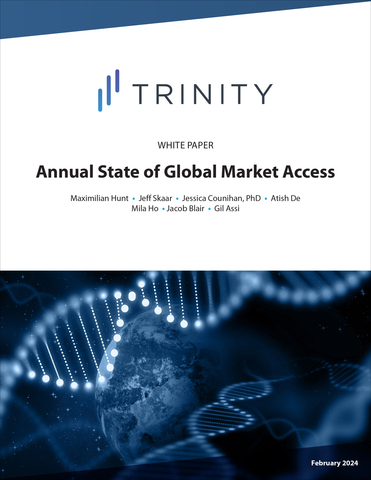WALTHAM, Mass.– Trinity Life Sciences, a leader in global life sciences commercialization solutions, announces the availability of its Annual State of Global Market Access white paper, an evaluation of six key global market access trends that life sciences companies need to be monitoring in 2024 and beyond. The paper explores the consequences of new therapeutic advances and policies aiming to control costs globally and the implications for pharmaceutical manufacturers. An upcoming webinar entitled Annual State of Global Market Access provides a deeper review of a few trends highlighted in the white paper—the continued expansion of cell and gene therapy, evolving evidence expectations, and increased market delays and withdrawals due to low reimbursement.
Trinity conducted a survey in November 2023 to capture payer insights about the trends discussed in the white paper. The sample consisted of 17 U.S. payers and 26 payers from global markets across four continents. The results of the survey reveal payers’ concerns about the rising cost of therapies and their outlook for navigating the growing number of approvals of the cell and gene therapies and other new drug modalities. As the innovation delivered by novel molecular entities continues to grow, payers’ evidence expectations are also evolving. The need for thoughtful evidence to support strategic pricing, access and reimbursement will remain critical as payers continue to acknowledge its importance in their decision-making.
The white paper also delves into recent cost-effectiveness policies, including the Inflation Reduction Act (IRA) in the U.S. and Germany’s Financial Stabilization Act. Compared to previous years, 2023 featured an increased number of market withdrawals and delays due to lower reimbursement opportunity, driven by both policy and intensive cost cutting in the U.S. and EU markets. The paper reports that another impact of lower reimbursement opportunity may be the pursuit of launches based on cash payments rather than reimbursement through payers, as observed with some GLP-1s for the treatment of obesity. The rapidly increasing demand for weight loss medications emerged as a key, unexpected budget impact in 2023, with 41% of surveyed payers highlighting these products as the most significant budget impact over the next 5 to 10 years.
“As the pricing and market access landscape continues to evolve, companies must strategically focus on protecting value within the U.S. and EU markets while seeking growth opportunities in other markets,” said Maximilian Hunt, Partner in the Evidence, Value, Access & Pricing practice at Trinity Life Sciences. “Having a clear understanding of potential pricing and reimbursement hurdles early on and developing a robust mitigation strategy to ensure the right evidence is available at the time of approval is critical for successful entry across global markets.”
Looking ahead the white paper discusses the increased exploration of artificial intelligence (AI) and its applications in market access. Although utilization of AI for market access research is still in its infancy, U.S. payers surveyed for the white paper express openness to potentially leveraging AI for reimbursement approvals based on qualifying prior authorization criteria and highlight that other AI applications are already being explored at their institutions.


